Olá Portugal! My summary and my feelings about the recently finished LocWorld40
I’m drafting this post from Lisbon airport while waiting for my flight to Spain. I write it with a lot of memories and different emotions experienced during this week.
In this 40th edition of LocWorld slogan was "Go Global, Be Global" and there have been numerous presentations, micro talks and panel discussions related to that topic. However, there have been 2 topics that attracted my attention.
2 topics 2 sensations, 2 conversations that appeared quite frequently in the different chat I had with different professionals from the industry; there was a pattern, independently if I was talking to LSPs, or technology providers or final clients, or consultants or individual freelances ... it appeared again and again. Those 2 topics were ...
fear and
a feeling that there’s a lack of innovation in the industry
Fear
I felt fear during the week; fear that NMT, AI or a disruptor outside the industry (something similar to AirBnb in the hotel business or Uber in taxis ...) will be taking over us in the next 5 years.
In the world, there are optimistic and pessimistic people, and my vision of the industry is positive, actually very positive! so if you, dear reader, are from the group of pessimists, you can stop reading this post in this very same paragraph ... Or better yet, keep reading and leave me in the comments that I am an unconscious idealist dreaming with fluffy unicorns ....
Why am I optimist about the future of Localization?
I have been in the industry for 24 years, and there is a pattern that I detected throughout these decades ... We are a paranoid, and fearful group of professionals; we are always afraid! Let's look at this in hindsight ...
From 95-00 when I started working on my first localization projects, once the industry was settled with the first standards of I18n, Localization, LQA best practices etc etc. I detected the first patterns of fear ... at that time it was normal for companies to have their internal teams of translators, localization engineers, QA testers; then the outsourcing movement began; outsourcing of teams/tasks to vendors or to other countries with a more competitive production cost. It is true that there were changes in the industry and layoffs. Actually, I was among them when the department in which I was working moved to India, but new opportunities arose...
Once that tendency of outsourcing stabilized, the boom of the GMS (Global Management Systems) came as tools to manage the translation content. Until then there were many manual production tasks. Project managers often had a very manual job. Fear arose again, many auguries appeared that this type of software would destroy many jobs related to the linguistic management of the projects, and once again, the pessimists were wrong, the industry continued to grow
Then came the rise of the Translation Memories (TM), that wave of pessimism took strength again, if a translator had the text pre-translated from previous translation jobs ... how was he supposed to make money? Fewer words to translate= less income, right? Error, TM opened new opportunities to translate more content as translators became infinitely more efficient
And we arrived to…. today, we’ve been talking for a few years about Machine Translation, Neural Machine Translation, AI... it seems "the Terminators" are going to destroy the community of translators and other professionals that are involved in it ... and I think, that again it won't happen.
Yes, of course, we will have to change the way we work, we will have to acquire new skills. The graph below can give us an idea of the skills that we will have to acquire in order to remain competitive and relevant
Probably, also we have to change the Localization model as we know it.
In a world in which Continuous Localization is the trend, a traditional model of price per words, minimum fee and other vestiges associated with waterfall models will disappear.
In a world in which many users prefer content in real time, instead of perfect content will force the industry to adapt.
For people who need just a "quick and dirty" translation, I expect that machine translation will do the job well enough for many languages.
But for good translations, and translations in areas such as marketing, advertisement, transcreation, we will always need human experts. There will always be good, well-paid work for translators with specialist knowledge and good writing skills. There is a lot of content that the true meaning can lie "between the lines" or in what is not explicitly stated. An experienced translator can handle the implicit and the explicit. NMT cannot.
We will have to rethink many aspects, for example, is the myth of perfect quality still valid? And perhaps it will force us to rethink a basic question, why do we localize content? There will always be users willing to pay for high-quality content and users that instant translation is their criterion for consuming content. Probably a business model that is paid by number of visits or interactions with our content is the solution, perhaps a business model that pays to use the platform of the technology provider is the solution, perhaps a business model that is paid for hours and not for words is the solution ... or maybe the solution is nothing like that! But there’s one thing I have clear.
This industry has been afraid for 30 years that something is going to happen and everything goes to hell ... and this industry has been in a growing business for 30 years; each year with a business volume higher than in the previous year ... so ... every time I think about it I wonder how can we think that this industry is going to collapse if each year is growing? By pure common sense, the higher the business size ... the more business opportunities there are for the players in that industry, right?
Yes, it is true that the roles will have to evolve; what we understand by a traditional translator will become creative writers or storytellers or creators of local content. A project manager will become cultural consultants, or data analysts who will find a way to convert language data into business value; and proposing business ideas to leadership teams.
It is true that the roles we have as we know them will not exist much longer, but adaptability is important, and professionals in this industry who are willing to recycle themselves and embrace mindset of long-life students will find a way to combat those Terminators and those pessimists who have been screaming for years that this time, that this time NMT / AI will eliminate us forever.
- A sensation of lack of innovation in the industry.
This LocWorld has been special for me since I had the opportunity to be part of the jury (aka as Dragon) of the Process Innovation Challenge, and also a panel discussion on Innovation called Is There an Innovators Dilemma? Taking the Pulse of Real Innovation in the Globalization Industry
On the stage with the talented Esther Curiel and Yuka Nakasone…. and our ceremonies master Mr Ruane!
It has been the LocWorld of innovation for me 😅
For all those who think that the industry lacks innovation, I recommend that you contact Dave Ruane and listen to what this charming "Irlandandaluz" has to tell you about innovation and about his idea of the Process Innovation challenge! Dave has organized already a few LocWolrd PIC challenges in the last editions. The PIC challenge is a platform for innovations and innovators in the localization and translation industry, held during the Localization World conferences. The challenge event gives innovators a chance to pitch their ideas to peers and experts. The audience votes for the Process Innovator of the year. More about the PIC Challenge HERE
Personally, I think it's a very nice event. Dave does it with a lot of love, passion and in a very pro way! He is responsible for contacting professionals within different sectors of our business to find candidates for the Innovator of the Year award. He also takes care of all the logistics and preparations so that each year the Challenge is a success.
In this LocWorld the winner has been Giulia Tarditi Head of Localization at Monese. She presented a concept of innovation super interesting since it attacks one of the traditional pain points of the industry. The source text and the quality of the source text! The number of times I have heard (and said!) That the source text is everything, but what would happen if the source text does not really exist, what would happen if a translator receives the content to translate with an explanation of what for example a button has to do? A briefing, what if the source text is dropped?
I liked Giulia's proposal, and I wish her all the best with her idea of Goodbye Source Text! This innovation resonated with me, and this is where I want to stop a bit to reflect on the concept of innovation. The question about what is innovation appeared on different occasions, not only during coffee breaks, meals or dinner during LocWorld, but also how could it be otherwise during the panel discussion.
Dave with the Innovator winner Giulia! congrats!!!
What is innovation?
This is when we started thinking about how the iPhone changed the mobile industry or how Uber is redefining the way in which we move; Yes, that's right, these are innovative products / concepts, but innovation can also be other ideas that a priori seem "smaller", but also solve a problem for someone. A script that allows finding missing fonts of Japanese in the UI of my app? That's innovation, a macro that allows me to extract and export terms to another app, that's innovation, a utility that detects me the maximum length of the buttons on my interface and thus is able to avoid those ugly truncations that we see on our screens, that too it's innovation
In the end, as I see it, that is the definition and the concept of innovation. Innovation begins when people start using your idea. Innovation is about solving problems. I believe that what we should really ask is, why can innovation fail in the localization industry?
In my opinion, there are several reasons that can cause the innovation to fail
My personal Top 5 is as follow
- Low-Quality Innovation
- The Perception of Value is low
- They don’t know you (personal branding)
- There is no time
- Be Courageous; Develop resilience
Download the infographic PDF below to access the details + link and video material references to get a better understanding of these different reasons.
The language industry has been used to reinvent their business, services, and needs during the last 30 years, and I believe it'll continue the same pattern in the next 10 years. I'm sure that we will do it more rapidly and radically. But there are 2 things that I have clear, all the people that solve a problem to someone will have a place in the industry, there will be times that these innovations are disruptive while other times they will be incremental, improvements; which in the long run it's not a big deal. As Kevin O'Connor says in his book Mapping Innovation
"I found that every innovation strategy fails eventually because innovation is, at its core, about solving problems - and there are as many ways to innovate as there are types of problems to solve. There is no one "true" path to innovation"
This post comes to an end, now it's time to reflect on all the ideas I've heard from all these talented and passionate people with whom I've had the pleasure of interacting in these last days.
Below some glimpses from a wonderful week. Safe travels to everyone and see you hopefully at the next LocWorld! !!















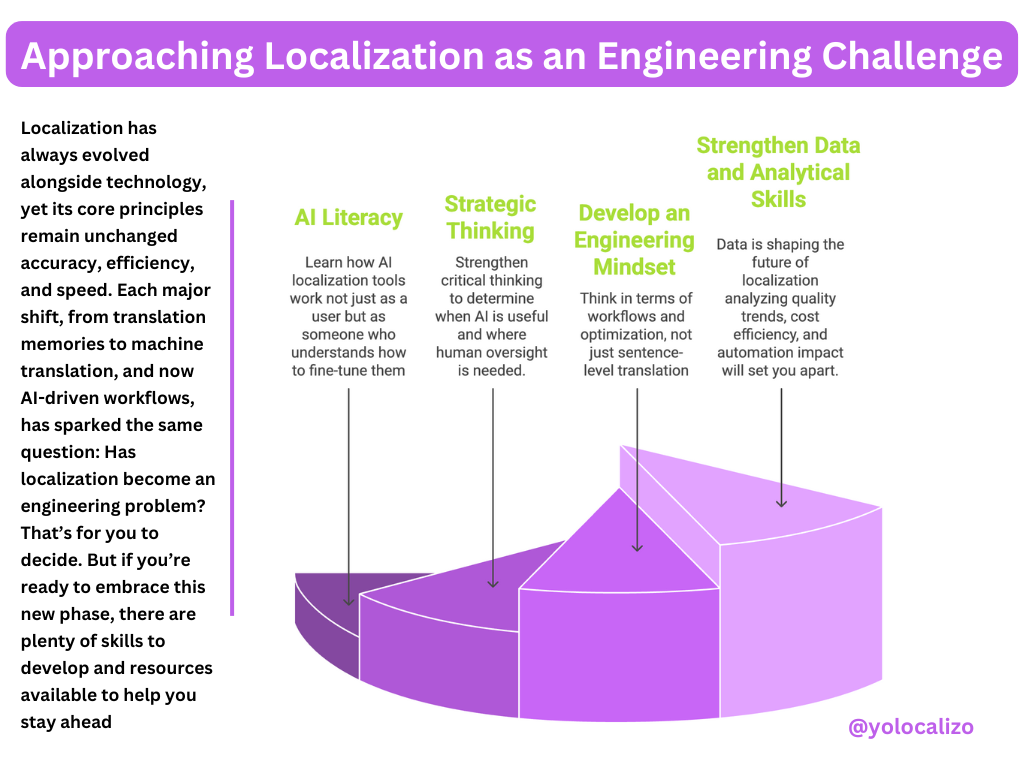













Before jumping on the AI bandwagon: What localization problem are you trying to solve? AI is everywhere right now, including in localization.
But before jumping on the bandwagon, we need to stop and ask:
Are we solving the right problem?